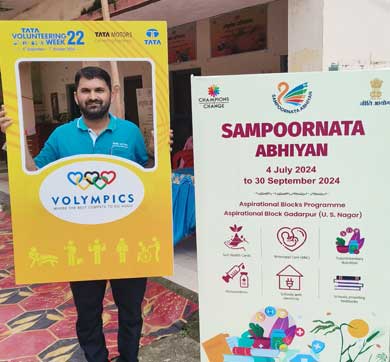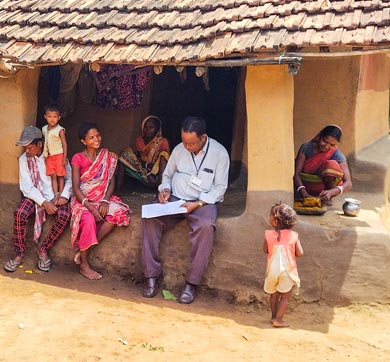July 2025 | 977 words | 3-minute read
Saraipani. A tiny, remote village tucked away deep in the recesses of Jharkhand. Here, a familiar sight unfolds each day with the setting of the sun, plunging the village into an endless labyrinth of darkness.
In the absence of electricity, men hastily retreat to their homes even as the women folk tend to household chores in the kitchen while the children can neither study at home nor step outside to play. Forced to rely on kerosene as the sole source of illumination — which often gave rise to respiratory problems and irritation to the eyes — villagers often spend more than ₹150 per month, which puts an enormous strain on their resources.
Small hamlets in extremely remote locations such as Saraipani are still disconnected due to terrain obstacles, unreliable electricity and/or challenges of servicing a small and remote cluster. These clusters usually are settlements belonging to tribal families and/or displaced families living in remote hilly regions. Providing access to essential services to these locations is key for the equitable growth of all communities.
When all hope appears to be lost, a beacon of light pierces through this shroud of darkness. Enter Tata Capital’s Green Switch project — a flagship CSR initiative which provides affordable and clean 24x7 electricity to unelectrified households and in some of India’s most underserved regions and communities through renewable energy by adopting a decentralised community owned solar micro off-grid model. “Our objective was rooted in a simple yet powerful belief; that we could contribute meaningfully to India’s larger journey of reducing its dependence on fossil fuels. At the same time, we were deeply committed to reaching the unreached, ensuring that even the most remote communities, who have long lived without access to electricity, are not left behind in the nation’s progress. It was about enabling a cleaner future, while bringing light, quite literally, to those who needed it most.
Clean tech finance has been a strategic part of our core business portfolio, giving us deep insights into financing sustainable energy solutions. Building on that foundation, we saw a meaningful opportunity to apply this expertise in our community development efforts as well. The aim was to translate our business learnings into broader social impact, enabling access to clean, affordable energy for underserved communities and supporting India's larger sustainability goals in a more inclusive way,” says Sridhar Sarathy, Chief Ethics Officer & Head – Sustainability & CSR, Tata Capital.
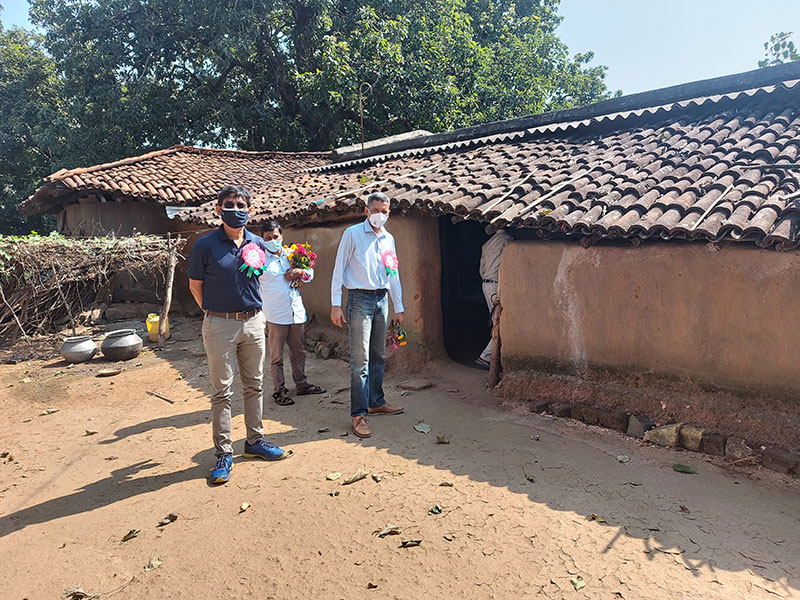
“In keeping with our philosophy of inclusivity and commitment towards Affirmative Action, we focused our efforts on reaching socially and economically disadvantaged families living in small, often overlooked hamlets to help transform their lives by bringing the dignity, opportunity, and hope that come with access to affordable and reliable electricity. We adopted a principle of simplicity, synergy, scalability and sustainability,” adds Mr Sarathy.
From vision to reality
This unique model of community contribution and ownership — inspired by Sustainable Development Goal 7 and the Power for All Scheme — began with a pilot project that was undertaken in the Palghar district of Maharashtra in 2016. The Green Switch project was later expanded to the state of Jharkhand in 2019-2020, followed by Uttar Pradesh in 2024.
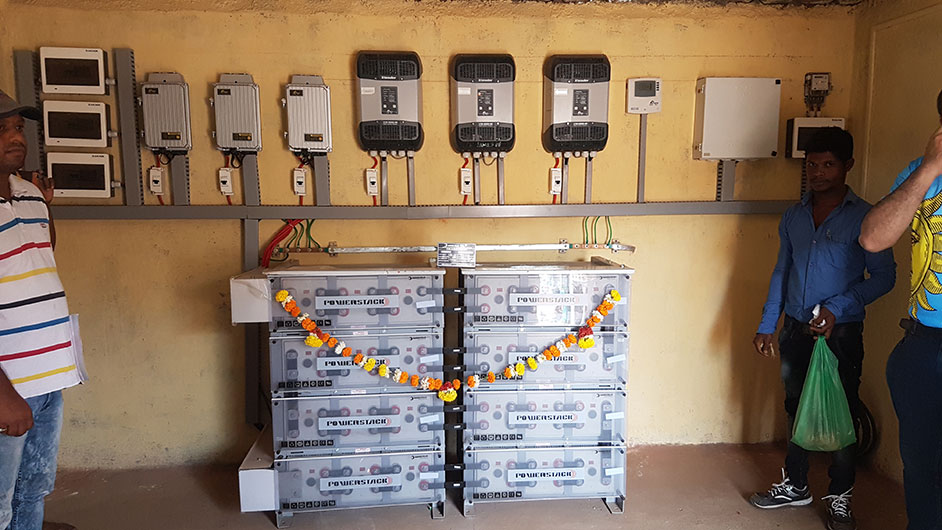
At the heart of the success of the Green Switch project — which is for the community, by the community and monitored by the community — lies a meticulously crafted implementation model, which commences with the identification of a completely unelectrified community/hamlet with a minimum of 35 homes in an aspirational district — which is willing to pay and own the model. The project has been implemented in collaboration with an NGO that is responsible for formalising it through signed MOUs with relevant stakeholders, securing clearances from local authorities, and facilitating land allotment in coordination with the community..
After a baseline study to assess socio-economic and health conditions, energy source and usage, a 5-7 member Village Energy Committee (VEC) — comprising 50% women — is formed which receives training on system, billing and reporting. The technical partner is responsible for implementing the project, which includes procuring the solar equipment and overseeing its installation. Awareness and education is of paramount importance as village operators are trained on crucial aspects pertaining to the maintenance of solar installations under the guidance of the VEC, which proceeds to collect tariffs from each household. The VEC is gradually empowered to take ownership of the project, which is formally handed over to them after a year of structured support and capacity building.
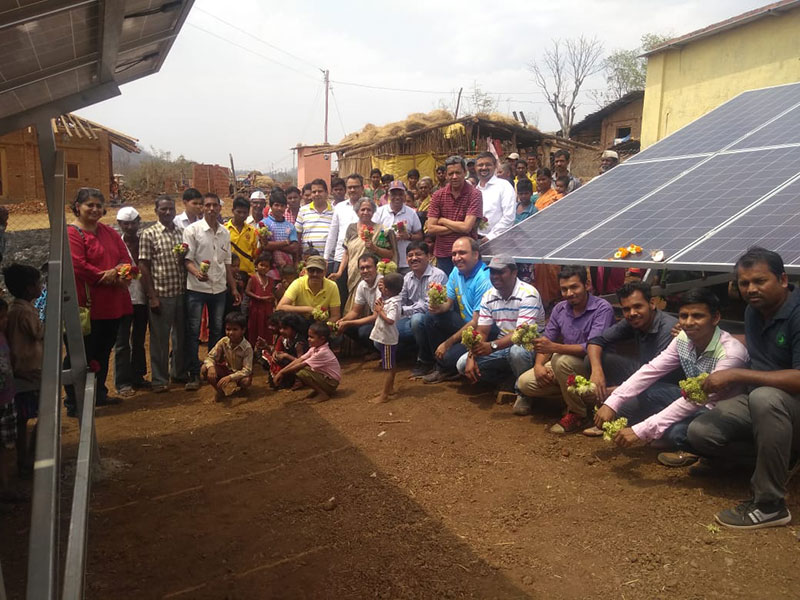
Metrics that matter
- 3 States
- 7 Blocks
- 5 Districts
- 99 Hamlets electrified
- 4,800 Homes illuminated for the first time
- 20,000+ Lives impacted
- 1.19 MWp Solar capacity installed
- 50+ Individuals became entrepreneurs
- 155+ Local grid operators trained
- INR 40,000 Average increase in annual income for entrepreneurs
- 290+ Solar pumps bought by farmers
The ripple effect
The streets of Saraipani no longer bear a deserted look when night falls thanks to the evolving effort with transformative potential undertaken by the Green Switch project in illuminating the area. “24/7 electricity has transformed our lives, making cooking easier and safer, allowing children to study longer without eye strain, and improving health by eliminating kerosene-related eye and breathing issues,” reveals Taramani, Treasurer of the VEC. “Villagers no longer have to worry about accidentally coming in the migration path of elephants or dying due to snake or scorpion bites. There has been a noticeable increase in their income, not only through sustainable farming practices, but also through emerging entrepreneurial efforts beyond agriculture, such as small businesses and local services, reflecting a growing sense of self- reliance and initiative,” adds Mr Sarathy, before concluding, “What gives us great contentment is the smile on the faces of the beneficiaries. That is our biggest achievement by far.”
- Sharmistha Choudhury














